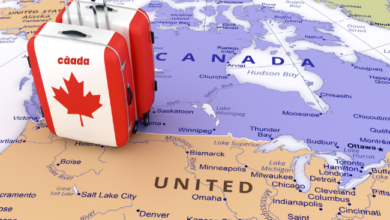How to Stay Healthy While Traveling Abroad

Traveling abroad is one of the most exciting and enriching experiences you can have. Exploring new cultures, tasting delicious food, and meeting people from all over the world can make your trip unforgettable. However, while traveling can be exhilarating, it can also be challenging for your health. New environments, different food, and changes in your routine can take a toll on your well-being if you’re not careful. In this article, we’ll share some practical tips on how to stay healthy while traveling abroad, ensuring you have a smooth and enjoyable trip without compromising your health.
1. Plan Ahead: Prepare for the Unexpected
Before you even board the plane, make sure to take some proactive steps to safeguard your health while abroad.
- Check Travel Vaccinations: Depending on your destination, certain vaccinations may be recommended or required. Common vaccines for international travel include Hepatitis A and B, Typhoid, and Yellow Fever. Make an appointment with your healthcare provider at least 4-6 weeks before your trip to get vaccinated and ensure you’re up to date on any routine immunizations.
- Consult Your Doctor: If you take regular medication, consult your doctor before your trip to ensure you have enough supplies for your journey. Some medications may also be restricted or hard to find in foreign countries, so it’s best to plan ahead.
- Travel Health Insurance: Invest in comprehensive travel health insurance to cover any unexpected health issues while abroad. This can include coverage for medical emergencies, hospitalization, or even repatriation in extreme cases. Having health insurance will give you peace of mind in case of an emergency.
- Pack a Health Kit: A travel health kit can help prevent or manage minor illnesses. Consider packing items like pain relievers, allergy medications, antiseptic wipes, hand sanitizer, reusable water bottles, and any over-the-counter medications you might need. Don’t forget your prescription medications in their original bottles with the appropriate documentation.
2. Stay Hydrated: The Importance of Water
Dehydration is a common issue while traveling. Long flights, changing climates, and unfamiliar foods can all contribute to dehydration. Staying hydrated is essential to maintain energy levels, prevent headaches, and support your immune system.
- Drink Bottled Water: In some countries, tap water may not be safe to drink. Always opt for bottled water, and make sure the seal is intact before purchasing it. If you’re in a country where tap water is safe, carry a reusable water bottle and refill it throughout the day.
- Limit Caffeine and Alcohol: While it’s tempting to indulge in local beverages, be mindful of how much caffeine and alcohol you’re consuming. Both can contribute to dehydration, so balance them with plenty of water. A good rule of thumb is to drink one glass of water for every caffeinated or alcoholic beverage you consume.
- Eat Hydrating Foods: Include fruits and vegetables with high water content in your meals, such as watermelon, cucumbers, and oranges. These can help you stay hydrated and provide additional vitamins and nutrients.
3. Be Careful with Food: Avoiding Traveler’s Tummy
One of the most common travel health issues is digestive discomfort. Traveler’s tummy, or traveler’s diarrhea, is often caused by eating contaminated food or drinking unsafe water. To avoid this, practice the following precautions:
- Eat at Reputable Places: Stick to restaurants that are busy with locals, as high traffic often indicates that food is fresh and the establishment follows proper hygiene practices. If you’re unsure, ask locals for recommendations.
- Avoid Street Food (Unless You’re Sure It’s Safe): Street food can be a delicious part of experiencing a new culture, but it can also be a risk. If you’re not familiar with the hygiene practices of food vendors, it’s better to avoid street food, especially raw or undercooked items.
- Peel Your Own Fruits and Vegetables: In some countries, raw fruits and vegetables may have been washed with contaminated water, which could cause stomach upset. If you eat fruits or vegetables, make sure to peel them yourself or choose ones that can be easily washed.
- Be Mindful of Dairy Products: If you’re traveling to a country where the milk may not be pasteurized, be cautious when consuming dairy products like cheese or ice cream. These products can sometimes carry harmful bacteria that may cause stomach issues.
- Consider Probiotics: Taking probiotics before and during your trip may help support your gut health and prevent digestive problems. Probiotics promote healthy bacteria in the intestines and can help combat the changes in diet and environment that travel often brings.
4. Prioritize Rest: Get Enough Sleep
Traveling often means long days of sightseeing, exploring, and navigating unfamiliar cities. While this can be exciting, it can also leave you feeling tired and fatigued. Sleep is crucial for maintaining a healthy immune system, keeping your energy levels up, and supporting mental well-being.
- Stick to a Sleep Routine: Try to maintain a regular sleep schedule, even if you’re in a different time zone. Gradually adjust your sleep habits a few days before you travel to minimize jet lag. Once you arrive at your destination, do your best to sleep at local night-time hours.
- Take Short Naps: If you’re feeling exhausted during the day, short naps (20-30 minutes) can be refreshing without leaving you groggy. However, avoid napping for too long or too late in the day, as it can interfere with your nighttime sleep.
- Create a Comfortable Sleep Environment: If you’re staying in unfamiliar accommodations, try to make your sleeping environment as comfortable as possible. Bring along earplugs or a sleep mask if you’re in a noisy area, and make sure your room is dark and cool for optimal sleep.
5. Get Active: Move Your Body
While it’s tempting to relax and enjoy your vacation, it’s important to keep your body moving. Exercise helps you stay fit, boosts your mood, and enhances your overall travel experience.
- Walk or Cycle: Walking or cycling around a new city is one of the best ways to explore. It’s a low-impact form of exercise that also allows you to see and experience more than you would by simply using public transport or taxis.
- Try Local Activities: Take advantage of local activities that promote health and wellness. Whether it’s yoga on the beach, hiking in the mountains, or swimming in a local lake, engaging in physical activity can be a fun way to stay fit while immersing yourself in the culture.
- Stretch Regularly: Long flights or bus rides can leave you feeling stiff and uncomfortable. Stretching your body regularly, especially after long periods of sitting, can help prevent stiffness, cramps, and muscle strain.
- Consider Fitness Classes: Many destinations offer fitness classes like Pilates, yoga, or dance lessons. If you’re looking to stay active while also experiencing local culture, participating in a fitness class can be a great way to break a sweat.
6. Protect Yourself from the Sun
Depending on where you’re traveling, exposure to the sun can be intense. While the sun can be a source of vitamin D, overexposure can lead to sunburn, dehydration, and an increased risk of skin cancer.
- Wear Sunscreen: Always apply broad-spectrum sunscreen with SPF 30 or higher before going outdoors. Reapply every two hours, especially if you’re swimming or sweating.
- Seek Shade: Whenever possible, try to stay in the shade during peak sunlight hours (10 a.m. to 4 p.m.). If you’re out and about, wear a hat and sunglasses to protect your face and eyes from harmful UV rays.
- Hydrate More in the Heat: If you’re in a hot climate, be sure to drink extra water to prevent dehydration, which can be exacerbated by exposure to the sun.
7. Stay Safe: Practice Basic Hygiene
Good hygiene is one of the easiest and most effective ways to stay healthy while traveling. Traveling abroad exposes you to new environments where germs and bacteria can spread quickly. To protect yourself:
- Wash Your Hands Regularly: Frequent handwashing with soap and water is one of the best ways to prevent the spread of germs. If soap and water aren’t available, use hand sanitizer with at least 60% alcohol.
- Use Antibacterial Wipes: In places where water and soap aren’t readily available, carrying antibacterial wipes or hand sanitizers can help you maintain cleanliness.
- Avoid Touching Your Face: Touching your face, especially your eyes, nose, and mouth, can transfer germs and bacteria. Be mindful of this, especially after touching surfaces in public places.
Conclusion: A Healthy Journey Awaits
Traveling abroad is an incredible opportunity to expand your horizons, but it’s essential to prioritize your health throughout the journey. By planning ahead, staying hydrated, being cautious with food, getting enough sleep, staying active, protecting yourself from the sun, and practicing good hygiene, you can enjoy a healthy and memorable trip. Whether you’re wandering through a bustling city or relaxing on a quiet beach, taking care of your well-being will ensure that you make the most of your adventure. Safe travels!



